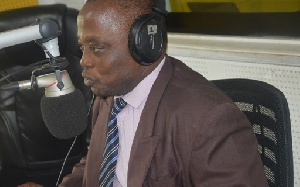One area through which state funds are leaked by public servants is in the payment of salaries, Auditor General (A-G) Daniel Yaw Domelevo has said.
According to him, his office will surcharge any head of public institution who continues to certify the payment voucher of persons who may have left the organisation but their names continue to appear on their payroll.
Mr Domelevo made this known on the Association of Chartered Certified Accountants' Think Ahead segment of the Executive Breakfast Show (EBS) on Class91.3FM on Tuesday, 21 February.
“Another area of leakage [in the public sector] is the payroll,” he told show host Moro Awudu. “You hear of it every time, you hear of ghost names. How on earth can you say you are in charge of a hospital or in charge of a school and you don’t know that your teacher is no more coming to school?” he wondered.
“So if a headmaster, for instance, or a principal of a secondary school or for that matter a university vice chancellor or whatever departmental head keeps approving or certifying the payment voucher while that voucher has got one, two, three, or four names who do not belong to the institution where the payment is being made or they don’t belong to his unit or they’ve left and he continuously signs, what do you think should happen to such a person? The financial administration regulation is very clear on that. It says that if it is identified, we will surcharge you and that is exactly what we are going to do. We will surcharge and then the headmaster will go and look for the ghost.”
He also identified procurement as one of the major means through which public servants siphon state funds.
According to him, during auditing, the Auditor-General’s Service often identifies a lot of leakages in the public sector through the procurement process.
“The main area of leakage is, number one, procurement. Procurement is a very terrible area,” he stated.
“At times nothing has been bought but all the paper work is there to establish that we have built a school. A contract can be signed and there is documentation to show it has been built. The contract document which is produced to prove a genuine procurement is the same thing which is also produced to justify a fake or a non-existing procurement.
“Sometimes the vehicle is not there, it has not been bought but you have a classmate who works with Toyota Ghana…who knows where some loose documents are so he goes and gets an invoice and a receipt book so he gives you an invoice for the purchase of the car and also a receipt acknowledging payment of the money and you would come and file it in your books. So, when the auditors come, you would say ‘yes, we procured’. They can put adverts in the papers and say ‘this is the advert, these are the tender documents, the evaluation report and this is payment, so we bought it’. The next question is: where is the vehicle? And at times you don’t find the vehicle. So that is where there is the need for auditing.”
He noted further: “Somebody comes in with a different eye to look at what you say you have done to say yes the money has been used for the intended purpose or the money was used for the intended purpose, but with disregard for value. At times it will surprise you to know that somebody goes to buy 1000 computers at a price higher than one computer in the shop and you ask what the logic in that is. If I’m buying one computer for GHS500, it suffices that if you are buying 1000 computers, you should get them at a lower price, but at times you find it the other way round. So that is where we can prove that you used the procurement process but not value for money.”
Mr Domelevo advised public servants to desist from such practices, wondering: “If it is money from your pocket will you have used it that way?”
General News of Tuesday, 21 February 2017
Source: classfmonline.com
State funds leaked through payroll – Auditor General
Entertainment
















